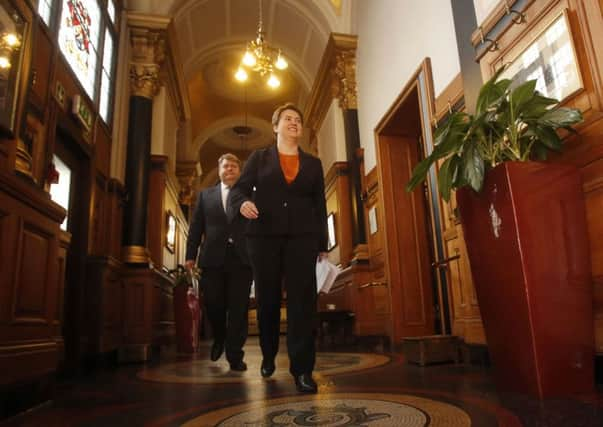Analysis: Davidson lays ghost of Thatcher to rest


Nearly 130 years later and yesterday it played host to the Scottish Conservative Party’s admirably concise statement of devolutionary intent – the logical conclusion of that territorial concession to Scots distinctiveness back in 1885.
Of course in the interim the Conservative and – let’s not forget – Unionist Party was more often than not less than enthusiastic about devolution; devolution of administration, yes, but not legislative ability, except for a short-lived Heathite commitment post-1968.
Advertisement
Hide AdAdvertisement
Hide AdEven once the Conservatives had clearly lost the constitutional battle (badly) at the 1997 general election its acceptance of the Scottish Parliament often appeared grudging. So the party has self-evidently been on a long journey.
Yesterday, taking questions from journalists following an opening statement from Lord Strathclyde, Ruth Davidson looked as if she meant what she said. A few hours later, usefully, the Prime Minister indicated his agreement and therefore assent.
Davidson had been on a journey too, although hers was much quicker. Just two-and-a-half years separate her “line in the sand” remark (relating to the 2012 Scotland Act) and her current “radical” commitment to a more “grown-up” settlement for Holyrood.
In truth that line began to get washed away almost as soon as Davidson had uttered it. In early 2012 David Cameron travelled to Edinburgh to promise (undefined) powers in the event of a No vote – yesterday his Scottish party finally put the meat on that particular bone.
Of course there is cynicism, some of it justified. The SNP will hark back 35 years – as they always do – to Lord Home’s “vote no for a better bill” pledge. But given the contrasting Conservative record since 2010 it’s a little threadbare as an argument, while the SNP’s own record on supporting devolution is hardly rosy.
There was, however, an unexplained U-turn over the Barnett Formula. Just over a year ago when Davidson launched her devo commission she described this as being “in its death-throes”, yet when someone asked Lord Strathclyde about it yesterday morning he was quick to say it would not in any way be affected by the full devolution of income tax.
That aside, the Scottish Tory proposals were succinct and lucid, not as radical as the Scottish Lib Dems’ nor as cautious as Scottish Labour’s. After a rocky start Davidson has carved out a constitutional middle way and looked quite relieved as a result. As one senior Tory MSP told me the whole process felt quite “liberating”. “We’re laying,” he added, “the ghost of Margaret Thatcher to rest.”
• David Torrance is a freelance writer, journalist and broadcaster